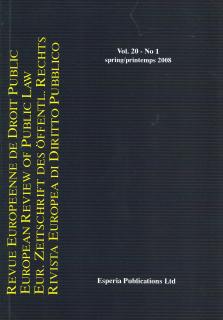
European Security: Austria
Tatjana Cardona / Andreas Lehner
University of Vienna
The events of 9/11 in the United States, as well as the bombing of trains in Madrid 2004 and of buses and underground stations in London 2005 had a major impact on the European Union’s approach to the issue of public safety and security. Driven by the public awareness of the imminent dangers of terrorism, the EU improved the cooperation and information exchange between the authorities of the Member States and the Institutions of the European Union. Apart from a constitutional amendment to implement the European Arrest Warrant, the impact of the security measures on the Austria national legal system was marginal. The European Directive on the retention of data of 2006, for example, was recently questioned by some scholars, especially regarding the accordance of the Directive with the Austrian and European Fundamental rights guarantees. These doubts led to the political decision not to transpose the Directive before 2009 (if at all). Aside from the European Union’s security strategy, Austria furthermore preserves its security interests by the conclusion of State treaties. Austria concluded bilateral security-related treaties with most of its neighbouring countries and played a major role in the conclusion and adoption of the Prüm Convention.





















